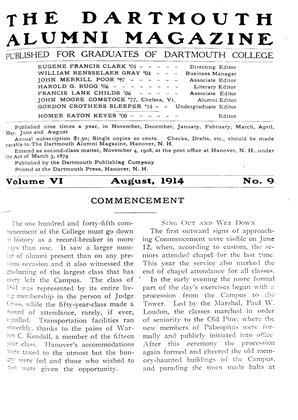*Reminiscences of the Eulogy of Choate on Webster: Charles Caverno 1854, Boston, Sherman, French and Company, 1914.
The author of this book of fifty-one pages, the Rev. Charles Caverno, D.D., was a student in college at the time of the event which he recalls. Choate's eulogy on Webster, given at the Commencement of 1853, marked an epoch among the Commencements of a period that was notable for the interest of its Commencements. Out of the memory of sixty years Dr. Caverno recalls the uniqueness of the occasion.
Yet his story is not so much a reminiscence as a reflection. It is natural that the personal should be more prominent than the scenic. It is not so much the great assemblage, gathered in the college yard to form the procession to the church, where the eulogy was to be delivered, or the vast throng that in anticipation of entrance crowded about the church doors., like a "swarm of bees clinging to the sides of a hive," or the guard chains that were necessary to keep them back, or the solemn appearance of the church interior, draped in black, on which were set forth Webster's last words': "I still live," or the bursting storm that shrouded the church in darkness, that stirs Dr. Caverno's memory, but the speaker and his message.
As one reads the eulogy today, wonderful as it is, he feels how much its immediate effect owed to the personality of the orator. His tall, gaunt frame, his leonine head with its abundant crown of black and curly hair, his lustrous eye, his penetrating voice, and his manner, subdued from its customary vehemence, to a calmness suited to the occasion, had their part in the effect whose marvellous power was attested by all who heard him. That effect, lingering in the memory of one of his hearers, is the motive of these reminiscences. Choate, the orator, lives in his memory and is bodied forth by his imagination as still speaking an immortal eulogy.
But after all, the orator and the occasion are of less moment than the man they commemorated, and in the greater part of the book memory gives way to reflection. It is Webster, not Choate and his great eulogy, that has the author's attention, and he constantly passes from one and another reminisence of the eulogy to a defense of Webster's character and actions, or to. an exaltation of his genius. He admits that in his student days, at the time of the eulogy, he shared in the fervid abolitionist hostility to Webster for his seventh of March speech, and that he was not sympathetic with Choate's defence of it, but the passage of time and the logic of events have convinced him that in that speech Webster was, as elsewhere, true to his convictions and had the prevision of a great statesman, and that Choate's defence of the speech was amply sufficient, even before the logic and the morals of the speech were supported by the war of secession, which it had vainly attempted to prevent.
Dr. Caverno is to be thanked for his reminiscence, in which he has set an example that others of the alumni may fittingly follow. Many interesting events in the history of the College will pass forever out of view, unless they shall be rescued by such records as these. The First Half Century ofDartmouth College by Nathan Crosby, of the .class of 1820, and the Memorialof College Life by Alpheus Crosby, of the class of 1827, give us pictures of the early times that are invaluable and that cannot be duplicated. It is greatly to be hoped that men of later classes, in imitation of the Crosbys and of Dr. Caverno, may give similar pictures of their college days before it is too late.
 View Full Issue
View Full Issue
More From This Issue
-
 Article
ArticleCOMMENCEMENT
August 1914 -
 Class Notes
Class NotesCLASS OF 1899
August 1914 By George G. Clark, G.G. CLARK -
 Article
ArticleTHAYER SCHOOL OF CIVIL ENGINEERING
August 1914 By Robert Fletcher -
 Article
ArticleTHE COLLEGE YEAR
August 1914 -
 Article
ArticleDARTMOUTH MEDICAL SCHOOL, ITS PRESENT STATUS AND ITS POSSIBILITIES
August 1914 By Frederic Pomeroy Lord '98 -
 Article
ArticleTHE AMOS TUCK SCHOOL OF ADMINISTRATION AND FINANCE
August 1914 By Harlow S. Person
Article
-
 Article
Article$4,300,000 Given to Assist Expanded Medical Program
July 1958 -
 Article
ArticleWomen in medicine at Dartmouth
APRIL 1986 -
 Article
ArticleMath Professor Laurie Snell: Can You Explain This Problem?
October 1993 -
 Article
ArticleProgress and Prosperity: A Suggested Program
JANUARY 1932 By Adelbert Ames, Jr -
 Article
ArticleDartmouth's Intellectual Life
APRIL 1929 By Professor A. J. Scarlett -
 Article
ArticleDARTMOUTH SKI SCHOOL
February 1946 By STEPHEN J. BRADLEY '39

